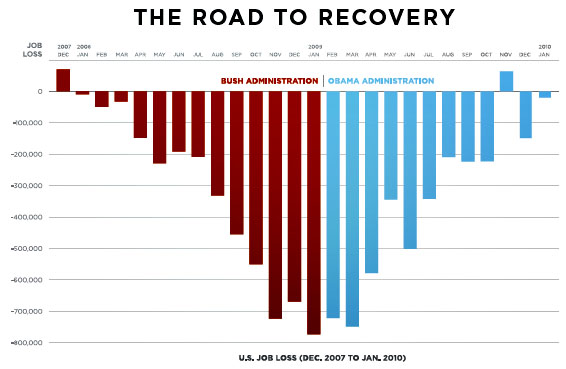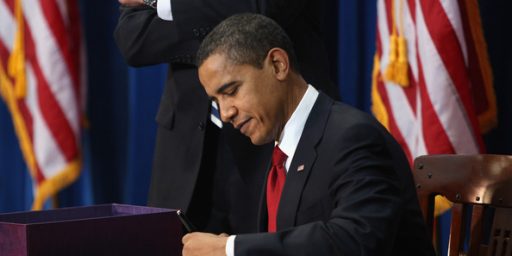Stimulus, Recovery, and Fallacies
NYT economic columnist David Leonhardt argues that the Obama economic stimulus package has “had a huge impact on jobs — employing something like two million people who would otherwise be unemployed right now.”
Kevin Drum agrees and presents a chart by Organizing for America (aka, Obama’s campaign PAC) to argue that “We still have a long way to go before job growth is back to normal, but the stimulus is getting us there a lot faster than we would have gotten there otherwise.”
Now, as I’ve said previously, I both opposed the stimulus package but think it likely did some good. How good, we don’t know — the two million figure is double most nonpartisan estimates — but it surely created some jobs. Hell, dropping that much money out of a helicopter would have created a bunch of jobs.
Further, I’ve conceded that the political realities were such that a President McCain would have had to pass something similar. Indeed, President Bush had already signed two bailouts and even circumvented the direct will of Congress to start bailing out the auto companies.
But the chart doesn’t tell us anything useful. Aside from the fact that the post hoc, ergo propter hoc fallacy is alive and well.
It’s quite probable that the worst of the recession — already one of the longest in history — was going to be over last spring, anyway. Jobs were likely to come back, anyway. They always do.
Beyond that, the stimulus package was passed in mid-February 2009 and much of the money still hasn’t been spent. That’s not Obama’s fault — it’s just the nature of funneling that much money into the economy, especially through the vehicle of state and local governments via the federal bureaucracy. Does anyone really think that the positive trend in jobs in April had much of anything to do with the stimulus package? Of course not.
Again, the stimulus was politically inevitable. It probably helped restore some confidence in the business sector and among consumers. It’s certainly helped to create some large number of jobs.






Which would mean that Mr. Obama was doing what a good, thoughtful, moderate president should do within realistic political limits.
As he has with HCR, the bailouts, DADT and his foreign policy.
I’m even starting to think Afghanistan might not be a complete fiasco. If it’s true that Pakistan’s ISI is backing us against the Taliban — and it’s too soon to be sure of anything with those snakes — then the risk to reward ratio in AfPak is substantially sweeter than it seemed to be.
It’s easy to see why the rage-o-holic ranting loons of the tea party hate Obama so obsessively. We seem to have an actual adult in the White House.
I supported it, but think that it won’t do jack sh!t
Stated with no sense of irony…hilarious.
You are in the extreme minority in saying this James.
Megan McArdle has her reservations about Obama’s rosy stimulus outlook:
And we have all seen this infographic…which is quite apt when we hear this administration assess itself on stimulus effectiveness…or any economic factors for that matter.
Are you claiming that “IHS Global Insight, Macroeconomic Advisers and Moody’s” (from your NY Times link) as well as the CBO are partisan?
That seems like a bit of a stretch.
The stimulus is perhaps 40% tax cuts (multiplier: 0.5-1.0) & 60% direct spending and aid to states (multiplier: 1.5). So $300-400B/year gives you $350-500B/year in effect.
According to Okun’s Law, 2-3% GDP gets you 1% employment. So $350-500B gets you something like 1.5% employment. So the stimulus should mean the difference between 10% unemployment and 11.5% unemployment.
Conclusions: 1. The stimulus should have been bigger (but that was politically unfeasible), and 2. the stimulus should have contained fewer tax cuts and more direct spending (also politically unfeasible).
None of those analyses is using measurements. All are comparing model results to model results.
Absent in all of these discussions is the G******D cost of these saved or created jobs, almost all of which are in the public sector. Hey, if we aren’t going to worry about the costs, why not have a $8T stimulus plan to solve the unemployment problem tomorrow? At least until the next election is past.
As to it being politically inevitable, that sounds positively Marxist as a rationale, if I may be so bold. But as a small businessman, I can assure you that it had a negative impact on business and consumer confidence from my perspective as it made it clear just how unimportant fiscal sanity was to this administration especially when the federal trough was being opened for all kinds of ideological activities. Ya know, it’s funny that ACORN is getting $4-5B out of the Stimulus plan. Heck, Greece only needs $50B to get out of its hole.
It’s nice how you can just do a search for the word “Acorn” now and identify all the political crazies.
“Acorn” is the new “Bushitler.”
The stimulus package and the anti-business attitude of that idiot in the Whitehouse lost more jobs than it created. The uncertainty and threat of large federal regulation prolong the recession instead of shortening it. In the end most of the stimulus will end up making politicians friends richer and most everyone else poorer.
Wayne:
Why don’t you go to the stimulus web site — all the programs are up there — and show us all some examples to support this statement:
Are you kidding? And unman the narrative? I think not.
Sorry wayne, I gotta call you on this one…
Yah… like the last idiot created so many jobs? Or was he just passing money onto his buds?
Ya know, I have a hard time listening to someone who will not point out the hypocrisy of “the other side”.
I point this out wayne, only because even as the GOP crows about how they voted against the Stimulus bill, they take credit for the money it brought to their district.
This may or may not be your position, but you would have a lot more credibility in my eyes if you were at least consistent (regardless of party)
Mr. Reynolds, you sir are an ass.
But please explain how noting that ACORN is getting stimulus money is somehow the equivalent of equating Bush with Hitler. I’m dying to hear a cogent defense of this indefensible slur.
Many of us called for a payroll tax holiday that would have had immediate impact on the economy by keeping dollars in employers hands and making a show of good faith to business. Instead we see a huge amount of what stimulus has been spent going to the public sector as some sort of payoff to the unions. Lovely.
The payroll tax holiday could still accomplish the two goals if implemented now. If we want to see employment go up Obama must stop his war against business and start realizing who creates those jobs we desperately need.
BTW that chart still shows us losing jobs just a a slower rate. That’s not recovery.
Steve:
Evidence for your contention that the stimulus money goes to payoffs to unions?
Evidence for a “war against business?”
Mr. Austin:
From Factcheck.org:
Michael, I’m sure, will have his own opinion, but I don’t think he was equating these two things. Instead, he’s saying that people who cry “ACORN” and “Bushitler!” reveal themselves to be cranks.
Herb:
Very well put. And much more succinctly than I’d have done.
WRT to jobs and the previous occupant of the White House. It is my understanding that after the Bush tax cuts the country realized four years of continuous job increases.
Slightly off topic, and I am sure FactCheck.org will point to an error in logic, however, our troubles seem to have manifested themselves after the 2006 when the Democrats took control of Congress.
I thought the McCain campaign was negligent for not highlighting this at every opportunity.
Davod,
Those Bush tax cuts were for the here and now. All we saw was deficits and debt, our jobs going overseas, our money going to Iraq, and the neglect of our country. You need to invest in your country, in your people, and in the future. And since that was not done, it will take some 10 to 20 years to get unemployment down to 5%.
WRT to tThe Administration’s employment projections of 95,000 new (not saved) jobs a month for 2010.
The Administration has also suggested that conducting the census will provide part time work for one million people.
Does this mean the Administration’s job creation aspirations are based upon one program that has nothing to do with the stimulus funds?
Davod:
We also saw job growth after Mr. Clinton raised taxes.
Of course if you believe tax cuts create jobs you must presumably believe the same of Mr. Obama’s tax cuts.
And please note that Mr. Bush’s tax cuts were still in effect as job loss began, and remain in effect as unemployment accelerated. And are still in effect today.
Wayne you are pretty close to following the rest of the lemmings over the cliff and leaving the land of rational thought entirely behind.
We are still in a difficult environment, but the business climate has been steadily improving almost from the moment Obama took office. Spend a little less time on rant sites and more with WSJ, Business Week & The Economist.
Heres something from that noted pro Obama rag, the Wall St. Journal:
Manufacturers
Gear Up to Hire
American manufacturers are seeing more signs that the nation’s economic recovery is on a solid footing, and their growing confidence is opening the way for new hiring, as well as callbacks of factory workers laid off during the recession.
http://online.wsj.com/article/SB10001424052748704398804575071652158793106.html?mod=WSJ_hpp_LEFTWhatsNewsCollection
I know that a recovering economy under Obama is cause for fury on the right, but I guess they will just have to deal.
I think the real irony is that so many conservatives disbelieved that there was a recession, until long after it was in swing. The “Obama talking down the economy” meme was priceless. Then they opposed stimulus, in part, for the same reason (“what recession?”).
… and then finally (before it is really over) “of course the recession is ending, they always do” (except when they don’t, see Japan 1980s).
(Again, see “structural” unemployment, and what it might mean in coming decades.)
“I think the real irony is that so many conservatives disbelieved that there was a recession,”
As I recall, the “Independent” US organization credited with pontificating on such matters revised its criteria when it set the start of the recession in the USA. The earlier than normal date meant the rest of the world could blame the USA for the world recession, as the Brits did immediately the announcement was made.
Michael, Evidence? How about logic. Using stimulus money on state and local public works projects benefited public employee union workers. Obama’s statements about the coal industry, the EPA’s decision on CO2 regulation, cap and trade legislation, health care reform that would have forced higher business costs, the list goes on when talking about the war on business.
It’s becoming tiresome that a few who post here continuously ask for citations and evidence when they disagree with a post. This isn’t a term paper in college and I’m not going to do research for others when it comes to generally available knowledge. Read a newspaper. The requests for citations and evidence are stalling techniques meant to derail the conversation. If you disagree then just say so but trying marginalize others statements in this way is wearing thin.
I might have missed another, but is that the only commenter who actually noticed what that chart was showing? Unless something drastic happened to reduce the US to 3rd World status, there is a limit to the number of jobs that the country CAN lose. As you approach that number asymptotically, the RATE of job loss slows. That has nothing to do with new jobs being created. Trying to portray this chart as something that it’s not (i.e., PROOF OF STIMULUS PANACEA!!) is either a mistake or it’s dishonest. All it shows is that the RATE of job losses has slowed which, while a good thing, indicates nothing more than that fact, with the possible exception that it might also show that we’re finally starting to bottom out in this recession.
Until or unless new jobs are being created, talk of recovery are pointless. And those new jobs need to be predominantly private sector, not public sector.
Thank you for clarifying, Steve. Now I understand that if a (Democratic) president suggests that blowing the tops off mountains and dumping their remains into public waterways to extract coal is perhaps not ideal for the environment, he is actually working to destroy business in America, and all businesses across the country will have to close down in order to protect themselves from this great evil.
Also, trying to fix the health care crisis that is bankrupting individuals while keeping large American companies from competing with their European counterparts is actually anti-business.
In fact, I guess it’s fair to say that anything other than inviting all companies to pour toxic waste into public reservoirs is viciously anti-business and must be opposed at all costs.
Because unfettered and completely unregulated business is what this country is all about.
Does that sum it up?
Well, if our jobs continually go overseas, then how can you have private sector jobs?
And what widgets can we make that they can’t make in China?
And with some 2 billion cheap laborers who want our jobs, is there a sufficient number of jobs to go around?
And if the stores are full of goods from overseas, what impact does that have as far as saving American jobs?
And with some 2 billion cheap laborers, it tells us that our wages and benefits have to come down.
And politically. How do we stimulate the economy when we already had 8 years of tax cuts and deficits and debt?
And the federal reserve has had low interest rates for a long time. Inflation coming? Higher interest rates?
And since the politicians have ignored our country for so long, it will take some 10 to 20 years to get unemployment down to 5%.
So I’m a crank for asking how money supplied to ACORN out of the Stimulus package is about creating jobs? And what’s more, I’m a crank equivalent of the Bushitler meme variety?
I was inclined after thinking about it overight to apologize for the personal attack. In fact, I’ll do so anyway out of respect to the proprietors of OTB, but I think you are way out of line with your accusations. Either that, or crank has become synonymous with disagreeing with your myopic view of events as they unfold.
Comparing model results to model results is comparing made up numbers to made up numbers. Now the people using these models have tried to design them as best they could. But what would be really handy is to see how well calibrated these models are. Did/are these models giving good predictions compared to reality. What did they predict for job losses in 2008 and 2009? What was the error? What about other macro variables?
Regarding Okun’s Law and Swank’s post that is exactly the issue that Dave is trying to point out in his one line post. Okun’s “Law” is a statisical relationship. The underlying theory is dubious. And the numbers Swank relies on are averages. The more accurate description is Okun’s rule of thumb. In other words, the realtionship could be,
1% delta in unemployment => a 2% delta in GDP
or it could be
.25% delta in unemployment => a 2% delta in GDP.
No. Okun’s law is that for every 1% increase in unemployment rate (not employment) results in a 2-3% decrease in GDP from its potential. Okun’s original statement of the law was thus,
The exact composition of these labor numbers changes from country to country and over time.
And Okun’s results do point to the possibility of jobless growth. An increase in labor productivity and the labor force can mean that output grows, but unemployment does not change.
wr,
Reductio ad absurdum. Your statements are a fine example of this flawed argument. You have to do better.